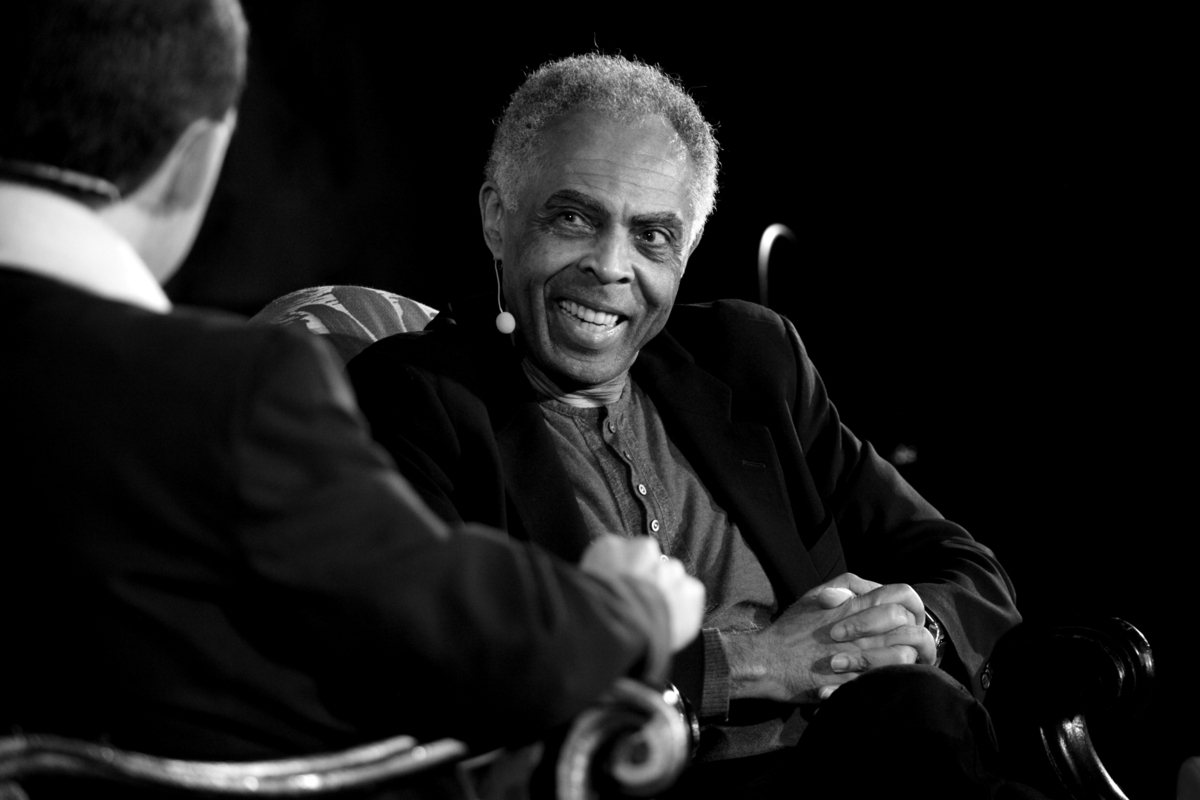Photo credit: Jori Klein
I am sitting behind Gilberto Gil at the New York Public Library. On Thursday evening, November 11th, Gil was in conversation with Paul Holdengraber, moderator and curator of the LIVE Series. Gil is a smallish man, lithe and for tonight dressed in dark colors. He opens the conversation with the song “Eu Vim da Bahia.” His voice is light, soothing and playful, much like the energy he exuded when he was sitting in front of me moments before.
Gil was born in 1942 in Salvador, Bahia. He is noted for ushering in the tropicália music scene with friend Caetano Veloso in the 1960s. Tropicália was very much influenced by the psychedelic rock that was coming out of the US at the time, and it was in large a response to the military government that had come to power in Brazil. Inspired by the Rolling Stones, whom Gil described as “young, pretty boys” making music that was grating and abrasive compared to the Brazilian bossa nova and samba, Gil recognized humanity and a rabble-rousing sensibility in their songs. It was their bad-mannered attitudes that the self- described troublemaker liked and cultivated: the long hair, the distortion of the music –the sounds were unruly and provocative. Challenging the status quo and having fun while doing it was seen as threatening by Brazil’s military regime, and would be the cause of Gil’s exile from Brazil in 1969. “I am very interested in the art of getting into trouble” Gil says to the audience with a laugh, “If you are looking for trouble you have come to the right place.” It would be interesting to hear Gil’s take on the recent protests around the world –especially as they are being fueled by young people who are looking to change systems that propagate the abuse of their populations.
Photo credit: Jori Klein
Music has been one of the quickest ways to challenge the ethos of corrupt and oppressive powers, aiding in galvanizing its listeners out of complacency. While living in London, Gil was introduced to reggae and in particular, the political roots music of Bob Marley. “Marley helped me identify what was African about Brazilian culture. What is was to be black.” Meeting Jimi Hendrix, briefly, backstage at a show, Gil stated that Hendrix also resonated with him, not only musically, but as a black artist. Tropicália, for Gil, was an opportunity to establish a new level for Brazilian music. It is the seeking of the new, the pushing of boundaries that Gil is after. Having always been intrigued by creating new forms of communicating and in making information widely available, especially via the internet, Gil said that he celebrates the notion of “everything for everybody.” Musically, one can access all of Gil’s albums via his website, not for downloading but for listening. In a culture where obtaining music and other forms of entertainment without paying is easy, it is interesting that Gil is less worried that making his music obtainable will deter people from buying his albums –a questionable position in a society where artists hope to make a living and find it increasingly harder to do so. As the Minister of Culture of Brazil from 2003 to 2008, Gil said that politics should promote not only dialogue between artists and government, but also accessibility for everyone. It is this openness that makes Gil appear so welcoming and humble. A soft positivity that one wonders comes from experiencing a series of extraordinary events. Imprisoned for three months, Gil was asked what prison taught him. His response: “Prison taught me yoga, meditation. Having a lemon and doing a lemonade with it.”
Gil ended the evening with a song of which I do not know the name (unfortunately), but can only remember the gentle “la-la-la-la” that he had us sing collectively with him.



